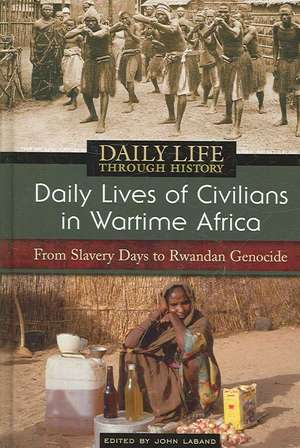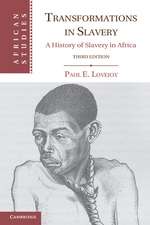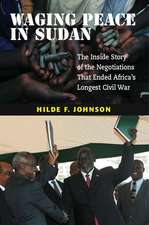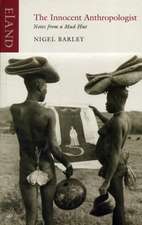Daily Lives of Civilians in Wartime Africa: From Slavery Days to Rwandan Genocide
Autor John Paul Clow Laband Ph.D.en Limba Engleză Hardback – 29 noi 2006 – vârsta până la 17 ani
Preț: 276.96 lei
Preț vechi: 478.07 lei
-42% Nou
Puncte Express: 415
Preț estimativ în valută:
52.100€ • 56.67$ • 44.19£
52.100€ • 56.67$ • 44.19£
Carte tipărită la comandă
Livrare economică 18 aprilie-02 mai
Preluare comenzi: 021 569.72.76
Specificații
ISBN-13: 9780313335402
ISBN-10: 0313335400
Pagini: 312
Dimensiuni: 156 x 235 x 28 mm
Greutate: 0.62 kg
Editura: Bloomsbury Publishing
Colecția Greenwood
Locul publicării:New York, United States
ISBN-10: 0313335400
Pagini: 312
Dimensiuni: 156 x 235 x 28 mm
Greutate: 0.62 kg
Editura: Bloomsbury Publishing
Colecția Greenwood
Locul publicării:New York, United States
Notă biografică
JOHN LABAND is Professor and Department Chair of the History Department at Wilfrid Laurier University, Kitchener, Ontario. He is the author of The Transvaal Rebellion: The First Boer War 1800-1881, (2005), Atlas of the Later Zulu Wars of the 1880s, (2001), The Illustrated Guide to the Anglo-Zulu War, (2000, along with Paul Thompson), The Rise and Fall of the Zulu Nation, (1997), and Kingdom in Crisis: The Zulu Response to the British Invasion of 1879, (1992).
Cuprins
Series Foreword Introduction: African Civilians in Wartime John Laband 1. Civilian Casualties in the Context of the Trans-Atlantic Slave Trade Paul E. Lovejoy 2. Zulu Civilians During the Rise and the Fall of the Zulu Kingdom, c. 1817-1879 John Laband 3. Civilians in the Anglo-Boer War, 1899-1902 Bill Nasson 4. The Impact of the First World War on African People Tim Stapleton 5. African Civilians in the Era of the Second World War, c. 1935-1950 David Killingray 6. Angolan Civilians in Wartime, 1961-2002 Inge Brinkman 7. Liberia and Sierra Leone: Civil Wars, 1989-2004 Lansana Gberie 8. The Consequences of Sudan's Civil Wars for the Civilian Population Jane Kani Edward and Amir Idris 9. The Making of the Rwandan Genocide and the Future Protection of Civilians in Africa Alhaji M. S. Bah Index About the Editor and Contributors
Recenzii
Nine contributions from Laband and other scholars discuss the impact of war on the daily life of civilians in various regions of Africa. Coverage spans time periods ranging from the late 18th century to the present day. A sampling of topics includes civilian casualties in the trans-Atlantic slave trade, the impact of WWI on African people, and the consequences of Sudan's series of civil wars on the civilian population. Laband teaches history at Wilfrid Laurier U. in Canada.













